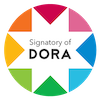Engagement laboral, una concepción científica: entrevista con Wilmar Schaufeli
Resumen
Wilmar Schaufeli es profesor de psicología del trabajo y las organizaciones en la Universidad de Utrecht en Holanda y profesor distinguido en la Universidad de Leuven en Bélgica. Fue listado como el profesor más productivo por la revista holandesa para la psicología y sus zonas fronterizas (1993-1995). En 2010 la Academia Europea de Psicología de la Salud Ocupacional lo distinguió como «fellow» por su destacada carrera y sus contribuciones al campo. Está en el puesto 22 de los académicos más importantes en el campo de la administración y también se encuentra en la lista de «las mentes científicas más influyentes en el mundo» por su alto número de citas en Thomson Reuters. Actualmente es reconocido por su creación del moderno concepto de «Engagement» y por ser autor de la escala «Utrecht Work Engagement Scale (UWES)». La presente entrevista se realizó en México por el autor del presente (AJ) en el 2010 durante su vista como conferencista magistral en el 3er congreso de factores psicosociales en el trabajo organizado por la Red de Investigadores sobre Factores Psicosociales del Trabajo en la Ciudad de México.
Descargas
Referencias
Juárez-García, A. (2012). Factores psicosociales asociados al agotamiento laboral (Burnout) y al entusiasmo (engagement) en enfermeras de un hospital público en México. En F. Arias & A. Juárez-García (Eds.), Agotamiento Profesional y Estrés. Hallazgos desde México y otros países latinoamericanos (1st ed., pp. 124-152). México: Editorial Porrúa.
Juárez-García, A., Hernández-Vargas, I., Flores- Jiménez, C., &Camacho-Ávila, A. (2015). Entusiasmo Laboral en Profesionales de la Salud: Propiedades Psicométricas de la Utretch Work Engagement Scale. En A. Juárez-García (2015). Investigaciones Psicométricas de Escalas Psicosociales en Trabajadores Mexicanos, (pp. 345-368). México: UAEM/ Plaza y Valdés.
Salanova, M. & Schaufeli, W.B. (2005). La Illusión por el trabajo (engagement): ¿El lado positivo del burnout? [Engagement: The positive side of burnout?] In J. Martinez, (Ed.) Quemarse en el trabajo (‘Burnout’) (pp. 73-92). Zaragoza: Egido Editorial.
Salanova, M. & Schaufeli, W. B. (2009). El engagement en el trabajo: Cuando el trabajo se convierte en pasión [Work engagement: When work turns into passion].Madrid: Alianza Editorial (ISBN 978-84-206-6854-3)
Schaufeli, W. B. & Bakker, A. B. (2010). The conceptualization and measurement of work engagement. In A. B. Bakker &
M. P. Leiter (Eds.), Work engagement: A handbook of essential theory and research (pp. 10-24). New York: Psychology Press.
Schaufeli, W. B. (2014). What is engagement?. In C. Truss, R. Delbridge, K. Alfes, A. Shantz, & E. Soane. (Eds.). Employee engagement in theory and practcie (pp. 15-35). London: Routledge.
Schaufeli, W. B., Bakker, A. B., & van Rhenen, W. (2009). How changes in job demands and resources predict burnout, work engagement, and sickness absenteeism. Journal of Organizational Behavior, 30, 893-917 (Emerald Citations of Excellence Award 2013).
Shimazu, A., Schaufeli, W. B., Kamiyama, L., & Kawakami, N. (2015). Workaholism vs. work engagement: The two different predictors of future well-being and performance. International Journal of Behavioral Medicine, 22, 18-23.
Descargas
Publicado
Número
Sección
Licencia
Derechos de autor: En caso de que el manuscrito sea aprobado para su publicación, los autores conservarán los derechos de autoría y cederán a la revista los derechos de publicación, edición, reproducción, distribución, exhibición y comunicación a nivel nacional e internacional en las diferentes bases de datos, repositorios y portales.
Política de autoarchivo: El autor puede compartir, difundir y divulgar sus investigaciones publicadas por los medios de comunicación (e.g., redes sociales académicas, repositorios y portales) disponibles en la web. Durante el proceso de revisión editorial, la revista entregará al autor las versiones previas (post-print), las cuales NO deben ser divulgadas por ningún medio de difusión y son solo de uso personal con fines de aprobación final. Liberabit enviará al autor la versión final del artículo (published version) en formato PDF y HTML para ser compartida, difundida y divulgada por los medios de comunicación disponibles en la web. Después de la publicación de los artículos, los autores pueden realizar acuerdos independientes o adicionales para la difusión no exclusiva de la versión del artículo publicado en la revista (por ejemplo, publicación en libros o repositorios institucionales), siempre que se indique con la referencia respectiva que el trabajo ha sido publicado por primera vez en esta revista.







